Why Does My Dog Bite My Hands? (6 SOLUTIONS)
We love our dogs, but some habits of theirs drive us absolutely batty. While some owners don’t seem to mind their dogs using their hands as chew toys, it IS an annoying little habit.
During play or interaction, dogs often chomp down on whatever they can get their little teeth into, including hands, limbs, ankles, and clothing. This behavior is actually a natural way for dogs to meet someone, connect, and learn.
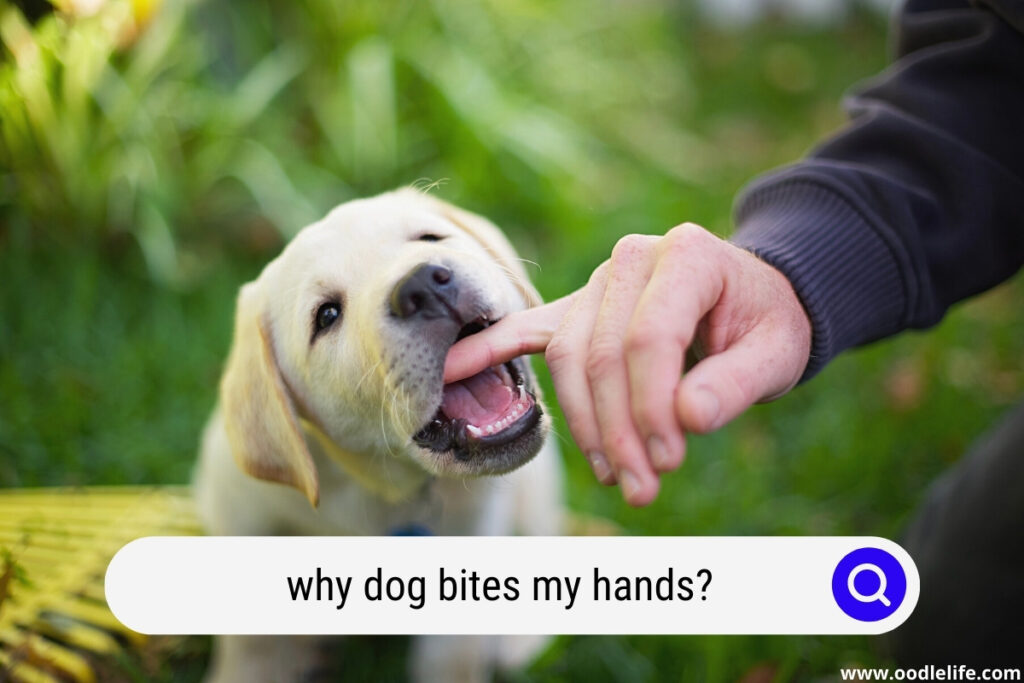
Although it is more common in pups, an adult dog may also grasp your hand when he is enthusiastic, wants to play, or is stressed.
Puppies’ jaws contain around 28 tiny blades like teeth that love to bite your fingers or toes. Dog trainers call it “play biting,” but when your canine appears to be all teeth, it’s uncomfortable and frequently painful.
Adult dogs’ jaws can inflict substantially more pain than puppy teeth, and large dogs can seriously hurt you, even if it was an accident.
Mouthing vs Biting
There’s a big difference between mouthing and biting, and it’s important to understand the distinction if you’re going to be spending time around dogs.
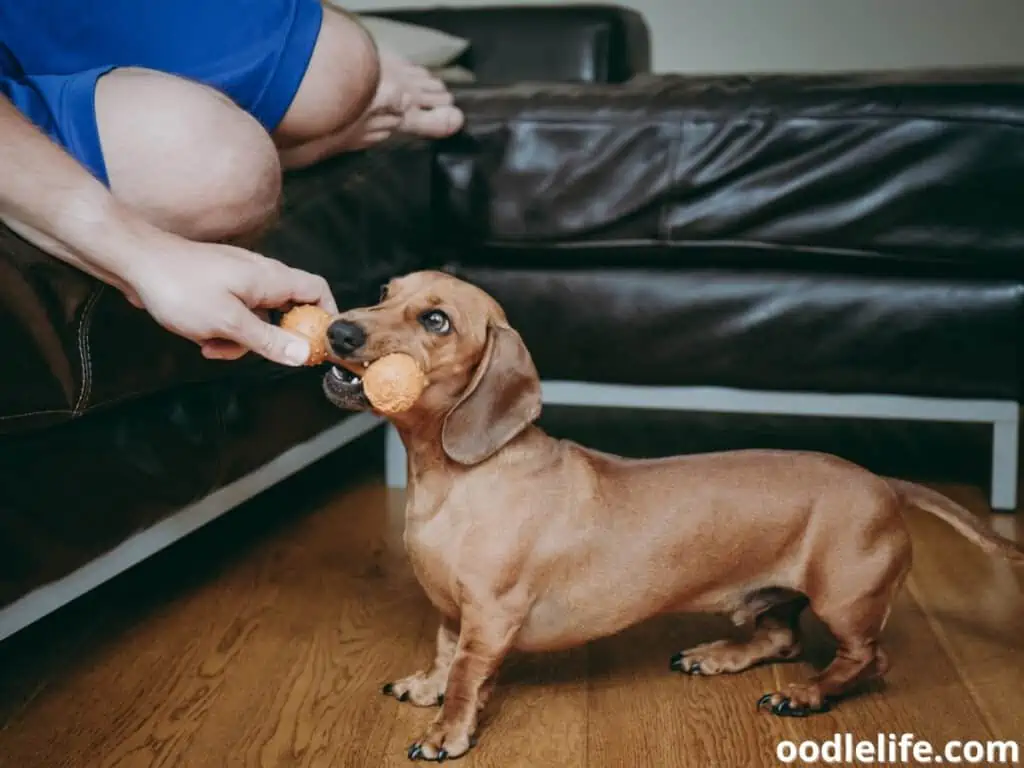
Mouthing is normal dog behavior and usually doesn’t involve any significant strength. It’s basically just exploring with the mouth, similar to how humans use their hands.
Puppies especially mouth things as they’re learning about their environment. Some dogs mouth as a way of asking for attention or play. Often, mouthing is done in a gentle way and doesn’t hurt (that bad), but when it is left unchecked, can get annoying and painful when a puppy doesn’t learn the boundaries of what is acceptable.
Biting, on the other hand, is when teeth can actually pierce the skin. This can happen out of aggression, fear, or frustration. It can also be a sign of illness or pain.
It’s important to be aware of the body language that dogs use to communicate because it can help prevent bites. Dogs will often give warning signs before they bite, such as growling, baring their teeth, or stiffening their body.
If you see these signs, it’s important to back away slowly and give the dog space. Don’t make sudden movements or loud noises, as this can startle the dog and trigger an attack.
If a dog is experiencing any of these signs, it’s important to get help from a professional before the situation escalates.
Knowing the difference between mouthing and biting can help you keep yourself safe around dogs, and also make sure you’re not inadvertently encouraging unwanted behavior. The good news is that the vast majority of the time that your pooch is chewing on you is probably just in play.
What Is Mouthing?
Mouthing, also called play-biting, is a typical dog habit that many owners have to cope with. It is a natural, instinctual manner for dogs to interact with others.
They use their mouth to explore the environment in the same way that we use our hands. Mouthing is not violent, but it can be annoying to people, particularly visitors to the house. It has the potential to be perceived as aggressive.
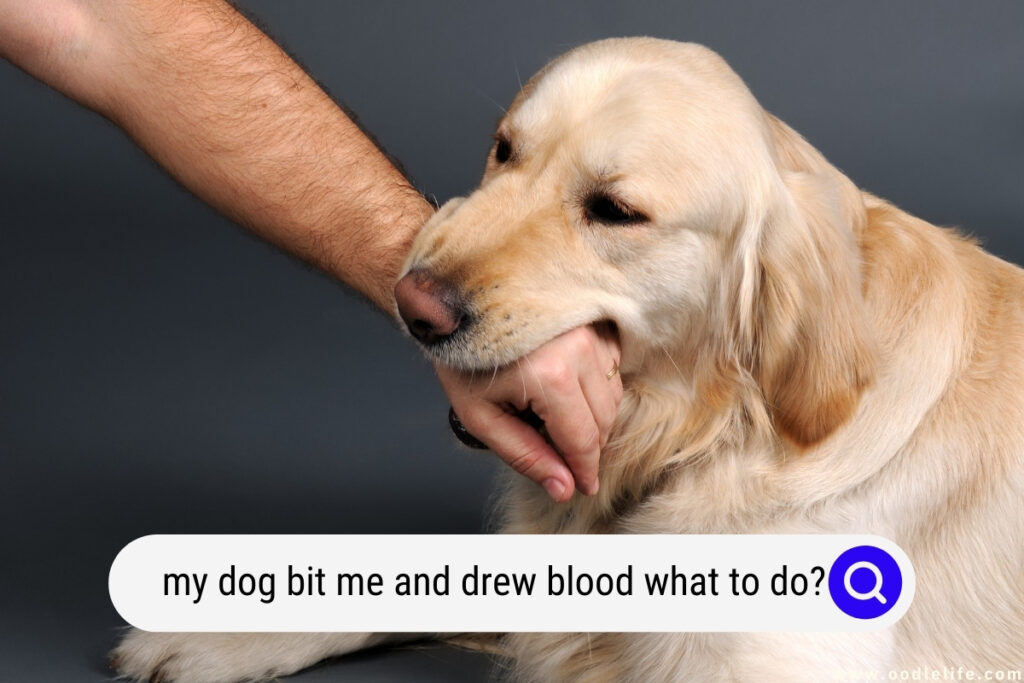
Is Mouthing Playful Or Aggressive?
When dogs are playing, they can bite on your hands and while this is seldom meant to hurt, it DOES! When it is accompanied by fearsome growling and snarling, it gets even more intimidating.
However, most mouthing is done in play. The majority of the time, playful dogs have relaxed bodies and faces. Although his snout appears wrinkled, his facial muscles are less tight.
Why Do Dogs Mouth?
Mouthing begins in puppyhood and continues throughout a dog’s life. Encouraging your dog to pull at your clothes, play tug-of-war with your socks, or mouth your hands teaches the puppy a harmful behavior that can become a concern.
Allowing a puppy to chew on your hands, skin, hair, or clothes tells him that it is fine to use us or our clothes as chew toys. Results can vary from a small wound that does not hurt the skin to a serious bite that requires medical care.
But what causes a dog bite? There are many reasons why dogs use their teeth to communicate. Dogs usually bite when they feel afraid, threatened, get excited, are being protective with food or treats, or are in pain.
It is very uncommon for dog bites to come out of nowhere, even if it sometimes looks like it. Unfortunately, humans often ignore the warning indications that can cause biting and this ignorance might result in more serious damage in the future.
How To Correct Biting in Puppies (6 Steps)
While most owners want to play and have fun with their pooches, it may be stressful and aggravating to be repeatedly nipped. Puppy teeth hurt!
- Suppress It
Some owners promote play biting, while others hate it. While play-biting improves your connection since your dog considers you as a friend rather than a danger, you should correct it if you are uncomfortable.
Training your dog and teaching the “stop it” command is an excellent strategy to decrease or eliminate play biting with people. When your dog begins to play-bite, you can stop playing, or redirect the attention towards his own toys.
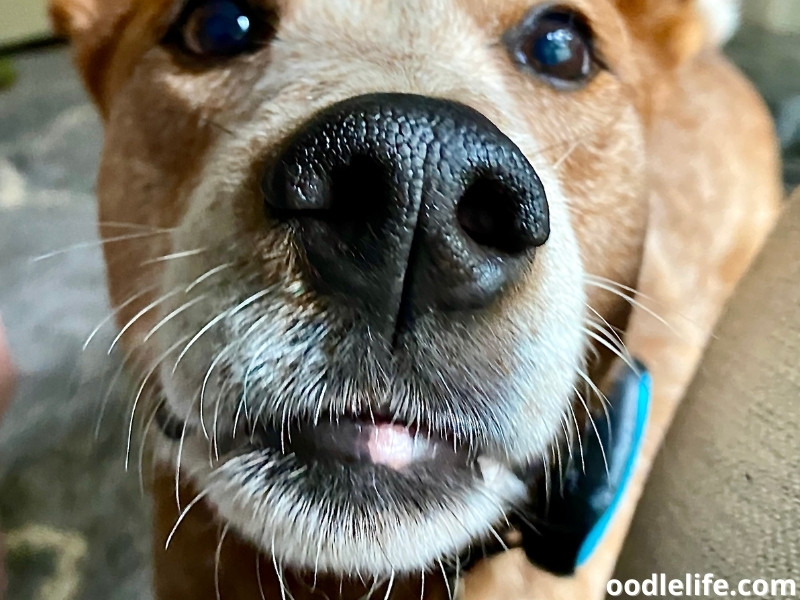
- Teach Control
Human hands are fragile little things compared to the thick fur and folds of a dog’s neck.
Puppies and dogs who have not learned to manage human bites do not notice the sensitivity of human skin and don’t know where the boundaries are. When playing with your dog, let him mouth on your hands and continue until he bites it down hard, and at that point give out a great yell and let your hand slip down limply to show pain.
This will get your dog’s attention and alarm him, and if this doesn’t work, you may use strong words. Reward your dog for stopping or licking you. Then restart the game. If your dog chomps on you again, yell loudly. This can help teach your dog what’s acceptable and what isn’t.
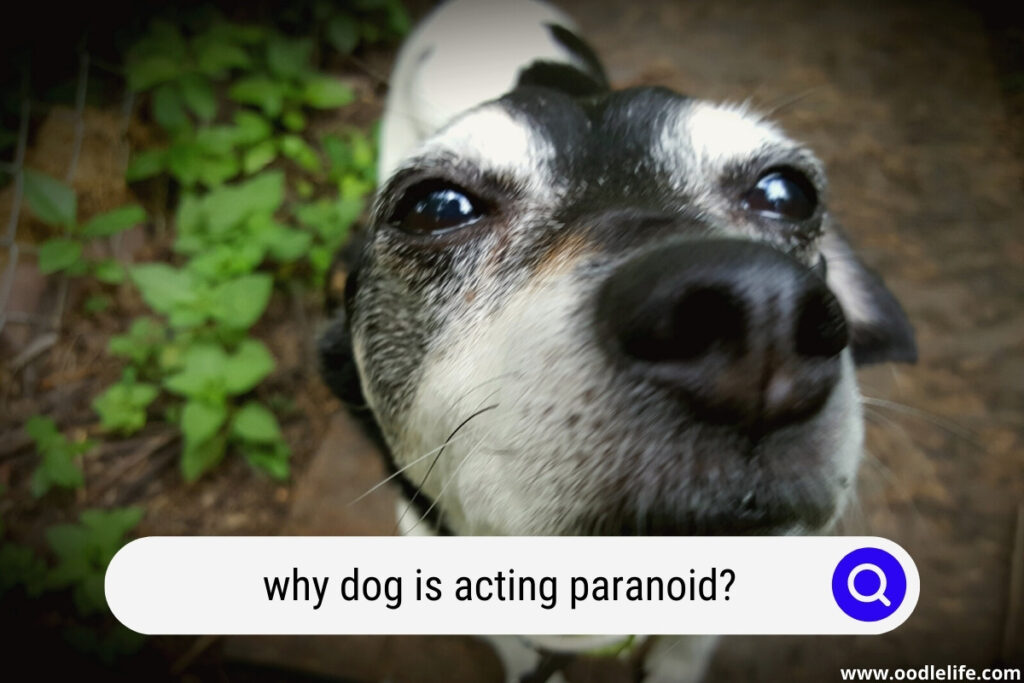
- Adequate Exercise
Under-exercised dogs tend to bite because they haven’t had a lot of physical and mental stimulation, causing loads of pent-up energy with no outlet.
Dogs are not only man’s best friend, but they are also great walking companions. Walking is a low-impact form of exercise that is great for people of all ages and fitness levels, and it’s also good for dogs.
Walking provides dogs with an opportunity to stretch their legs and explore their surroundings. It helps to relieve boredom and can even help to reduce separation anxiety. In addition, walking helps to keep dogs fit and healthy, which can add years to their life.
If you don’t have time for a long walk, even a short hike or tug-of-war or fetch session in the park will be beneficial for your furry friend.
- Redirect Attention
There are a number of things you can do to redirect your dog’s attention when he or she starts mouthing. One simple way to do this is to offer your dog a chew toy or bone. This will give your dog something else to focus on, and it will help to redirect his or her chewing habits in a positive direction.
You can also try teaching your dog some basic obedience commands, such as “sit” or “stay.” These commands can help to refocus your dog’s attention and give him or her something else to focus on.
Finally, remember to praise your dog when he or she stops mouthing. This will reinforce the desired behavior and help your dog to learn that mouthing is not acceptable.
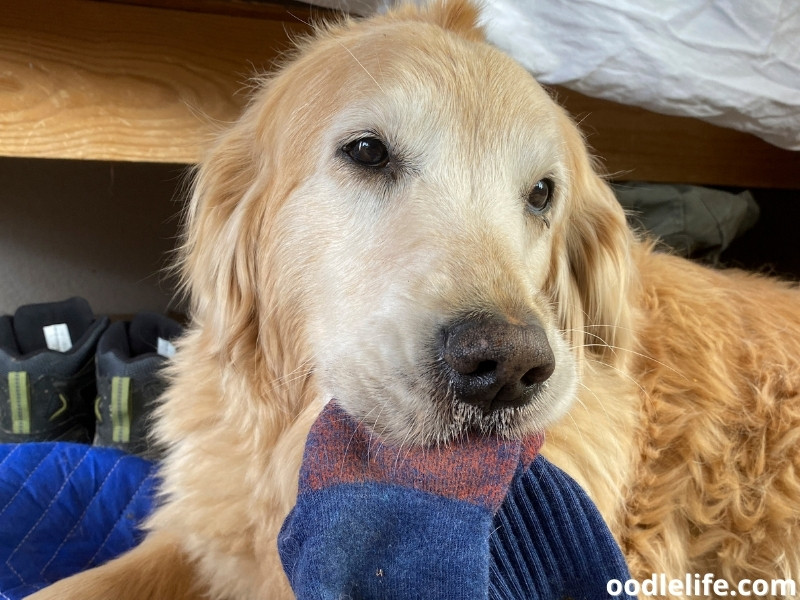
- Socializing
Some of the best teachers for puppies can be other dogs. Dogs are very good at helping each other learn what’s okay and what’s too aggressive. By playing with other dogs, your puppy will quickly learn how much to chew and bite on.
A simple note about dealing with your puppies is that you should always be there to supervise them! If the game becomes out of control or aggressive, act proactively and consciously and also be prepared to intervene.
Parents of many puppies find that the more properly they can socialize the milder the puppy’s biting experience.
- Time Out
If none of the above approaches work, you can try a time-out. Time-outs are frequently beneficial in reducing mouthy behavior in both pup and adult dogs. When your dog delivers a forceful bite, place them in their crate to calm down and avoid further biting. Once the puppy has calmed down, you may let it out.
Time-out does not indicate that you are forcefully disciplining or punishing your dog, but rather that you are distancing them from what they desire.
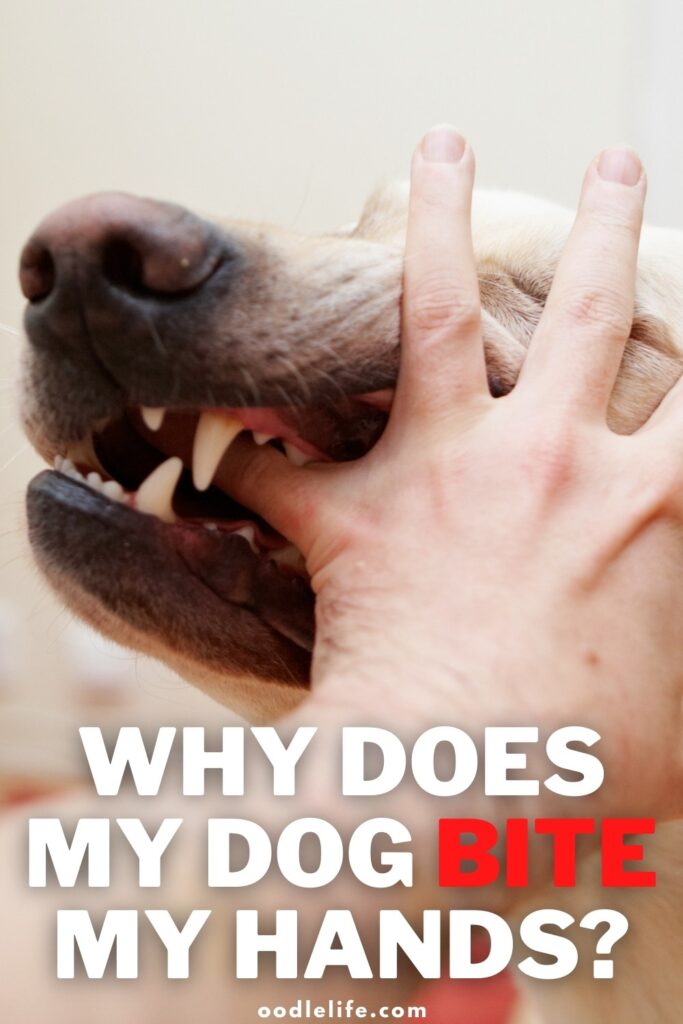
Final Thoughts
It is easy to let annoyance escalate into frustration, then anger, so be patient with your pooch and yourself.
Their progress may appear to be gradual (or non-existent), but any improvement is welcome! When striving to keep the puppy from biting, be consistent. Puppies can be confused when discrepancies creep in. And we all know that turmoil is not synonymous with growth.
With a little patience and persistence, you can help your dog learn how to stop mouthing in an appropriate way. Your hands will thank you!